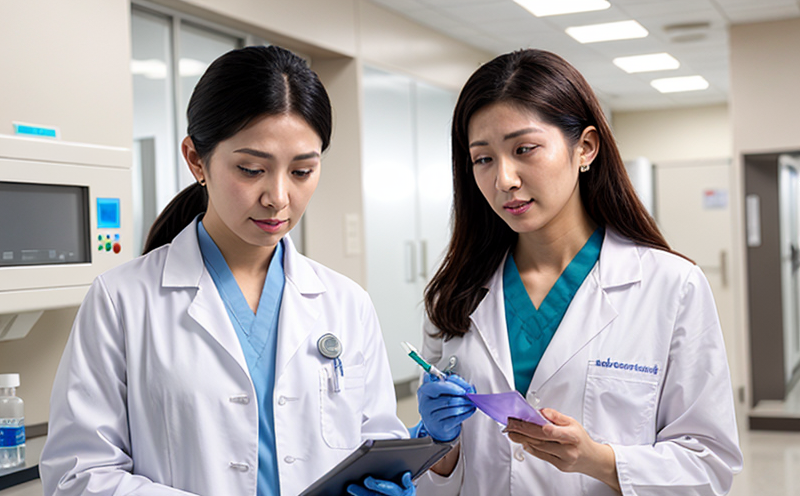USP Host Cell Protein Testing by ELISA
In the pharmaceutical industry, ensuring product quality and safety is paramount. The USP Host Cell Protein (HCP) Test by enzyme-linked immunosorbent assay (ELISA) plays a crucial role in this regard. This test ensures that the host cell proteins do not interfere with the efficacy or safety of biopharmaceutical products.
The USP HCP Test is an essential step in the development and manufacturing process for biologics like monoclonal antibodies, vaccines, gene therapies, and other complex biological entities. It helps to identify potential contaminants that could affect product stability and patient safety. This test is particularly important for biosimilars, where even minimal impurities can lead to significant regulatory challenges.
The ELISA method used in the USP HCP Test is highly sensitive and specific. It allows for accurate quantification of host cell proteins down to nanogram levels. The process involves several critical steps: sample preparation, assay setup, incubation, detection, and analysis. Each step must be meticulously executed to ensure reliable results.
Sample preparation typically includes the extraction of host cell proteins from the biopharmaceutical product using appropriate solvents and buffers. The extracted proteins are then diluted into a suitable matrix for ELISA analysis. Careful attention is paid to preventing any loss or degradation of the target analytes during this process.
The assay setup involves coating the wells of microtiter plates with monoclonal antibodies specific to host cell proteins. These antibodies capture the target proteins, which are then detected using a secondary antibody conjugated to an enzyme. After incubation and washing steps, the enzyme-labeled antibodies bind to their targets, leading to a colorimetric or fluorometric signal that is proportional to the amount of HCP present.
The accuracy and precision of the ELISA test depend heavily on standard operating procedures (SOPs) and quality control measures. Regular calibration of instruments, validation of methods, and adherence to international standards like USP 1462 ensure consistent results across different batches and laboratories.
Understanding the significance of this test in ensuring product safety is crucial for pharmaceutical companies involved in biopharmaceutical manufacturing. Regulatory bodies such as the FDA and EMA recognize the importance of HCP testing, making it a mandatory step in the approval process for new biologics and biosimilars.
By implementing robust HCP testing protocols, manufacturers can enhance product quality, reduce risks associated with impurities, and comply with stringent regulatory requirements. This not only protects public health but also fosters trust among consumers and healthcare providers.
Industry Applications
| Application | Description |
|---|---|
| Biosimilars Development | The USP HCP Test is critical for ensuring that biosimilars meet the same high standards as their reference products. It helps in identifying any potential differences due to host cell impurities. |
| Biopharmaceutical Manufacturing | In biomanufacturing, the test ensures that the process is free from contaminants that could affect product quality and stability. |
| Vaccine Production | The USP HCP Test helps in monitoring vaccine batches to ensure they are safe for use and meet regulatory standards. |
| Gene Therapy Products | In gene therapy, the test ensures that vectors used do not contain harmful host cell proteins that could compromise treatment efficacy or safety. |
| MonoClonal Antibody Production | This test is crucial for ensuring monoclonal antibodies are free from impurities that could interfere with their therapeutic effects. |
| Regulatory Compliance | The USP HCP Test supports compliance with international standards and regulations, thereby facilitating smoother product approvals. |
Customer Impact and Satisfaction
The implementation of the USP Host Cell Protein Testing by ELISA has a significant impact on customer satisfaction within the pharmaceutical industry. It ensures that biopharmaceutical products meet stringent quality standards, thereby enhancing product reliability and patient safety.
Customers, including regulatory bodies, healthcare providers, and patients, benefit from this testing method as it reduces the risk of adverse events associated with impurities in biologics. Regulatory agencies appreciate the thoroughness provided by such tests, ensuring that only safe and effective products reach the market.
Manufacturers who adopt robust HCP testing protocols are rewarded with increased trust among their customers and stakeholders. This leads to better relationships, higher sales, and improved brand reputation. Moreover, compliance with regulatory requirements enhances the credibility of the company in the competitive pharmaceutical landscape.
International Acceptance and Recognition
The USP Host Cell Protein Testing by ELISA is widely recognized and accepted globally due to its reliability and accuracy. Regulatory bodies such as the FDA, EMA, and WHO have endorsed this method as a standard for ensuring product safety and efficacy in biopharmaceuticals.
International standards like ISO 17025 and USP 1462 provide guidelines that ensure laboratories performing HCP tests meet rigorous quality assurance criteria. Adherence to these standards not only enhances the credibility of testing results but also facilitates seamless international trade and collaboration.
The widespread acceptance of this test in various countries underscores its importance in the global pharmaceutical industry. By aligning with these standards, manufacturers can ensure consistent product quality across different regions and regulatory environments.





